新概念英语第二册课文讲解及笔记(96课)
新概念英语第二册笔记(96课全)
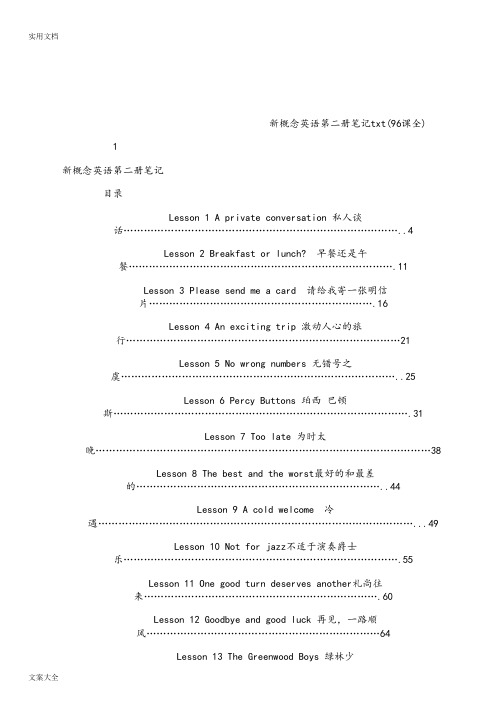
新概念英语第二册笔记txt(96课全)1新概念英语第二册笔记目录Lesson 1 A private conversation 私人谈话 (4)Lesson 2 Breakfast or lunch? 早餐还是午餐 (11)Lesson 3 Please send me a card 请给我寄一张明信片 (16)Lesson 4 An exciting trip 激动人心的旅行 (21)Lesson 5 No wrong numbers 无错号之虞 (25)Lesson 6 Percy Buttons 珀西巴顿斯 (31)Lesson 7 Too late 为时太晚 (38)Lesson 8 The best and the worst最好的和最差的 (44)Lesson 9 A cold welcome 冷遇 (49)Lesson 10 Not for jazz不适于演奏爵士乐 (55)Lesson 11 One good turn deserves another礼尚往来 (60)Lesson 12 Goodbye and good luck 再见,一路顺风 (64)Lesson 13 The Greenwood Boys 绿林少年 (68)Lesson 14 Do you speak English? 你会讲英语吗? (74)Lesson 15 Good news 佳音 (80)Lesson 16 A polite request 彬彬有礼的要求 (85)Lesson 17 Always young 青春常驻 (90)Lesson 18 He often does this! 他经常干这种事! (96)Lesson 19 Sold out 票已售完.......................................................................................................... (99)Lesson 20 One man in a boat 独坐孤舟 (104)Lesson 21 Mad or not? 是不是疯了? (110)Lesson 22 A glass envelope 玻璃信封 (115)Lesson 23 A new house 新居 (119)Lesson 24 It could be worse 不幸中之万幸 (122)Lesson 25 Do the English speak English? 英国人讲的是英语吗? (125)Lesson 26 The best art critics 最佳艺术评论家 (130)Lesson 27 A wet night 雨夜 (136)Lesson 28 No parking 禁止停车 (143)Lesson 29 Taxi! 出租汽车! (149)Lesson 30 Football or polo?足球还是水球? (154)Lesson 31 Success story 成功者的故事 (159)Lesson 32 Shopping made easy 购物变得很方便 (165)Lesson 33 Out of the darkness 冲出黑暗 (171)Lesson 34 Quick work 破案“神速” (177)Lesson 35 Stop thief! 捉贼 (180)Lesson 36 Across the Channel 横渡海峡 (186)Lesson 37 The Olympic Games 奥林匹克运动会 (193)Lesson 38 Everything except the weather 唯独没有考虑到天气 (198)Lesson 39 Am I all right? 我是否痊愈?......................................................................................................... (203)Lesson 40 Food and talk 进餐与交谈 (208)Lesson 41 Do you call that a hat? 你把那个叫帽子吗? (213)2新概念英语第二册笔记Lesson 42 Not very musical 并非很懂音乐 (219)Lesson 43 Over the South Pole 飞越南极 (224)Lesson 44 Through the forest 穿过森林 (229)Lesson 45 A clear conscience 问心无愧 (234)Lesson 46 Expensive and uncomfortable 既昂贵又受罪 (238)Lesson 47 A thirsty ghost 嗜酒的鬼魂 (243)Lesson 48 Did you want to tell me something? 你想对我说什么吗? (247)Lesson 49 The end of a dream 美梦告终 (250)Lesson 50 Taken for a ride 乘车兜风 (256)Lesson 51 Reward for Virtue 对美德的奖赏 (262)Lesson 52 A pretty carpet 漂亮的地毯 (267)Lesson 53 Hot snake 触电的蛇 (272)Lesson 54 sticky fingers 粘糊的手指 (278)Lesson 55 Not a gold mine 并非金矿 (282)Lesson 56 Faster than sound! 比声音还快! (291)Lesson 57 Can I help you, madam? 您要买什么,夫人? (298)Lesson 58 A blessing in disguise? 是因祸得福吗? (305)Lesson 59 In or out? 进来还是出去? (311)Lesson 60 The future 卜算未来 (315)Lesson 61 Trouble with the Hubble 哈勃望远镜的困境 (318)Lesson 62 Affer the fire 大火之后 (323)Lesson 63 She was not amused 她并不觉得好笑 (329)Lesson 64 The Channel Tunnel 海峡隧道 (334)第 1 页新概念英语第二册笔记txt(96课全)Lesson 65 Jumbo versus the police 小象对警察 (339)Lesson 66 Sweet as honey!像蜜一样甜! (344)Lesson 67 Volcanoes 火山 (349)Lesson 68 Persistent纠缠不休 (357)Lesson 69 But not murder!并非谋杀! (359)Lesson 70 Red for danger危险的红色 (362)Lesson 71 A famous clock 一个著名的大钟 (366)Lesson 72 A car called Bluebird“蓝鸟”汽车 (369)Lesson 73 The record-holder纪录保持者 (371)Lesson 74 Out of the limelight 舞台之外 (376)Lesson 75 SOS呼救信号 (380)Lesson 76 April Fools' Day愚人节 (386)Lesson 77 A successful operation 一例成功的手术 (388)Lesson 78 The last one? 最后一枝吗? (392)Lesson 79 By air 乘飞机 (397)Lesson 80 The Crystal Palace 水晶宫 (400)Lesson 81 Escape 脱逃 (403)Lesson 82 Monster or fish? 是妖还是鱼? (406)Lesson 83 After the elections 大选之后 (409)3新概念英语第二册笔记Lesson 84 On strike 罢工 (412)Lesson 85 Never too old to learn 活到老学到老 (415)Lesson 86 Out of control 失控 (419)Lesson 87 A perfect alibi 极好的不在犯罪现场的证据 (421)Lesson 88 Trapped in a mine困在矿井里 (423)Lesson 89 A slip of the tongue 口误 (426)Lesson 90 What's for supper? 晚餐吃什么? (429)Lesson 91 Three men in a basket 三人同篮 (434)Lesson 92 Asking for trouble 自找麻烦 (437)Lesson 93 A noble gift 崇高的礼物 (439)Lesson 94 Future champions 未来的冠军 (442)Lesson 95 A fantasy 纯属虚构 (445)Lesson 96 The dead return 亡灵返乡 (447)本文档仅用于学习交流之用,不得用于商业目的。
新概念英语第二册笔记-第96课
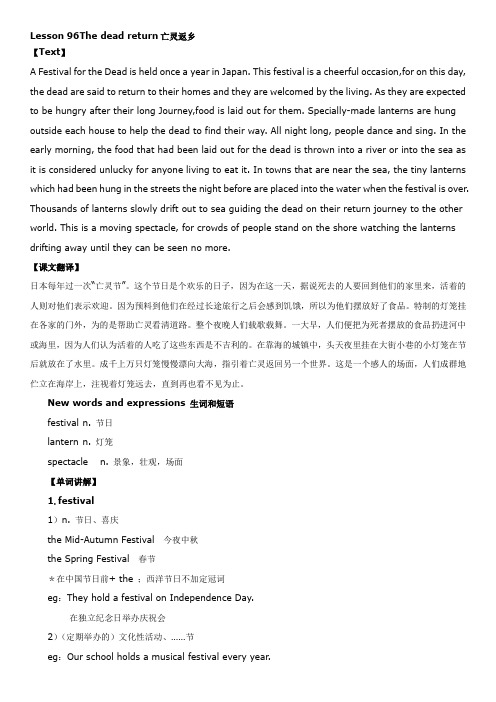
Lesson 96The dead return亡灵返乡【Text】A Festival for the Dead is held once a year in Japan. This festival is a cheerful occasion,for on this day, the dead are said to return to their homes and they are welcomed by the living. As they are expected to be hungry after their long Journey,food is laid out for them. Specially-made lanterns are hung outside each house to help the dead to find their way. All night long, people dance and sing. In the early morning, the food that had been laid out for the dead is thrown into a river or into the sea as it is considered unlucky for anyone living to eat it. In towns that are near the sea, the tiny lanterns which had been hung in the streets the night before are placed into the water when the festival is over. Thousands of lanterns slowly drift out to sea guiding the dead on their return journey to the other world. This is a moving spectacle, for crowds of people stand on the shore watching the lanterns drifting away until they can be seen no more.【课文翻译】日本每年过一次“亡灵节”。
新概念英语第二册笔记(全部96课全)96465
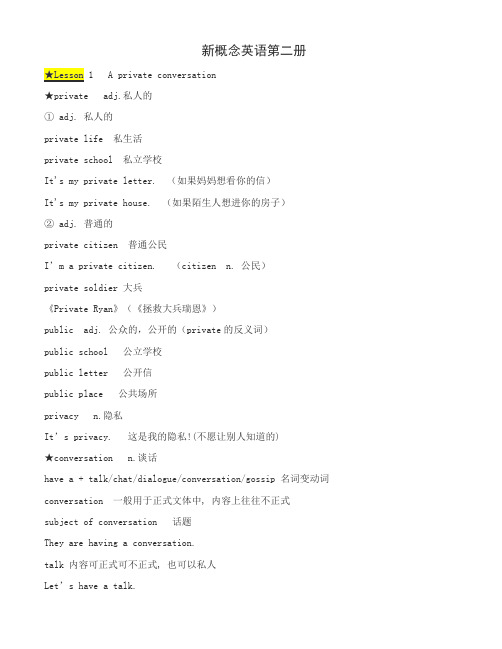
新概念英语第二册★private adj.私人的① adj. 私人的private life 私生活private school 私立学校It's my private letter. (如果妈妈想看你的信)It's my private house. (如果陌生人想进你的房子)② adj. 普通的private citizen 普通公民I’m a private citizen. (citizen n. 公民)private soldier 大兵《Private Ryan》(《拯救大兵瑞恩》)public adj. 公众的,公开的(private的反义词)public school 公立学校public letter 公开信public place 公共场所privacy n.隐私It’s privacy. 这是我的隐私!(不愿让别人知道的)★conversation n.谈话have a + talk/chat/dialogue/conversation/gossip 名词变动词conversation 一般用于正式文体中, 内容上往往不正式subject of conversation 话题They are having a conversation.talk 内容可正式可不正式, 也可以私人Let’s have a talk.dialogue 对话, 可以指正式国家与国家会谈China and Korea are having a dialogue.chat 闲聊,就是北京人说的“侃”,说的是无关紧要的事。
gossip 嚼舌头, 说长道短★theatre n.剧场, 戏剧cinema n.电影院★seat n.座位have a good seat/place,这里的seat指place(指地点),而不是chair. take a seat/take your seat 坐下来, 就坐Is the seat taken 这个位置有人吗请坐的3种说法 :Sit down, please. (命令性)Take your seat, please.Be seated, please. (更礼貌)作为动词的seat与sit的区别sit(sat,sitten) vi. 就座He is sitting there. 他坐在那儿。
(完整版)新概念英语第二册笔记(全部96课全)(1)
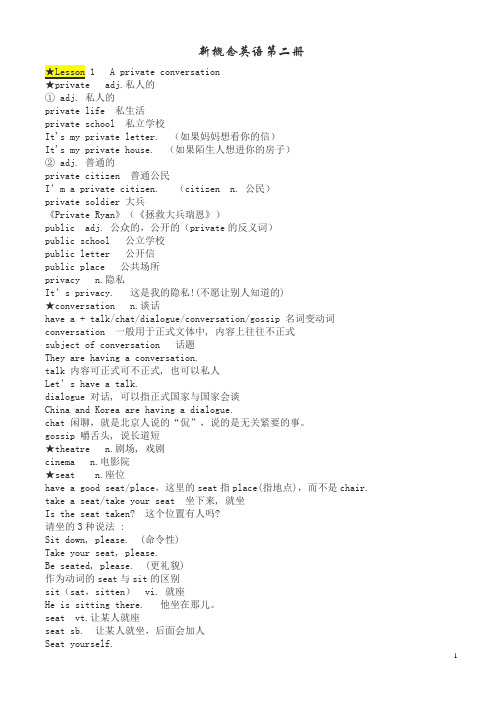
新概念英语第二册私人的① adj. 私人的private life 私生活private school 私立学校It's my private letter. (如果妈妈想看你的信)It's my private house. (如果陌生人想进你的房子)② adj. 普通的private citizen 普通公民I’m a private citizen. (citizen n. 公民)private soldier 大兵《Private Ryan》(《拯救大兵瑞恩》)public adj. 公众的,公开的(private的反义词)public school 公立学校public letter 公开信public place 公共场所privacy n.隐私It’s privacy. 这是我的隐私!(不愿让别人知道的)★conversation n.谈话have a + talk/chat/dialogue/conversation/gossip 名词变动词conversation 一般用于正式文体中, 内容上往往不正式subject of conversation 话题They are having a conversation.talk 内容可正式可不正式, 也可以私人Let’s have a talk.dialogue 对话, 可以指正式国家与国家会谈China and Korea are having a dialogue.chat 闲聊,就是北京人说的“侃”,说的是无关紧要的事。
gossip 嚼舌头, 说长道短★theatre n.剧场, 戏剧cinema n.电影院★seat n.座位have a good seat/place,这里的seat指place(指地点),而不是chair. take a seat/take your seat 坐下来, 就坐Is the seat taken? 这个位置有人吗?请坐的3种说法 :Sit down, please. (命令性)Take your seat, please.Be seated, please. (更礼貌)作为动词的seat与sit的区别sit(sat,sitten) vi. 就座He is sitting there. 他坐在那儿。
新概念英语第二册精华笔记(96课完整版)

新概念英语第二册★Lesson 1 A private conversation★private adj.私人的① adj. 私人的private life 私生活private school 私立学校It's my private letter. (如果妈妈想看你的信)It's my private house. (如果陌生人想进你的房子)② adj. 普通的private citizen 普通公民I’m a private citizen. (citizen n. 公民)private soldier 大兵《Private Ryan》(《拯救大兵瑞恩》)public adj. 公众的,公开的(private的反义词)public school 公立学校public letter 公开信public place 公共场所privacy n.隐私It’s privacy. 这是我的隐私!(不愿让别人知道的)★conversation n.谈话have a + talk/chat/dialogue/conversation/gossip 名词变动词conversation 一般用于正式文体中, 内容上往往不正式subject of conversation 话题They are having a conversation.talk 内容可正式可不正式, 也可以私人Let’s have a talk.dialogue 对话, 可以指正式国家与国家会谈China and Korea are having a dialogue.chat 闲聊,就是北京人说的“侃”,说的是无关紧要的事。
gossip 嚼舌头, 说长道短★theatre n.剧场, 戏剧cinema n.电影院★seat n.座位have a good seat/place,这里的seat指place(指地点),而不是chair. take a seat/take your seat 坐下来, 就坐Is the seat taken? 这个位置有人吗?请坐的3种说法:Sit down, please. (命令性)Take your seat, please.Be seated, please. (更礼貌)作为动词的seat与sit的区别sit(sat,sitten)vi. 就座He is sitting there. 他坐在那儿。
新概念英语第二册逐句精讲语言点第96课(1)
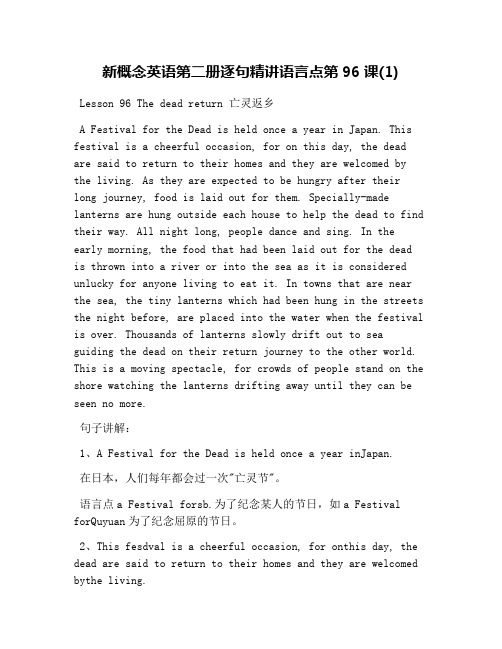
新概念英语第二册逐句精讲语言点第96课(1)Lesson 96 The dead return 亡灵返乡A Festival for the Dead is held once a year in Japan. This festival is a cheerful occasion, for on this day, the dead are said to return to their homes and they are welcomed by the living. As they are expected to be hungry after their long journey, food is laid out for them. Specially-made lanterns are hung outside each house to help the dead to find their way. All night long, people dance and sing. In the early morning, the food that had been laid out for the dead is thrown into a river or into the sea as it is considered unlucky for anyone living to eat it. In towns that are near the sea, the tiny lanterns which had been hung in the streets the night before, are placed into the water when the festival is over. Thousands of lanterns slowly drift out to sea guiding the dead on their return journey to the other world. This is a moving spectacle, for crowds of people stand on the shore watching the lanterns drifting away until they can be seen no more.句子讲解:1、A Festival for the Dead is held once a year inJapan.在日本,人们每年都会过一次"亡灵节"。
新概念英语第二册笔记(全部96课全)96465
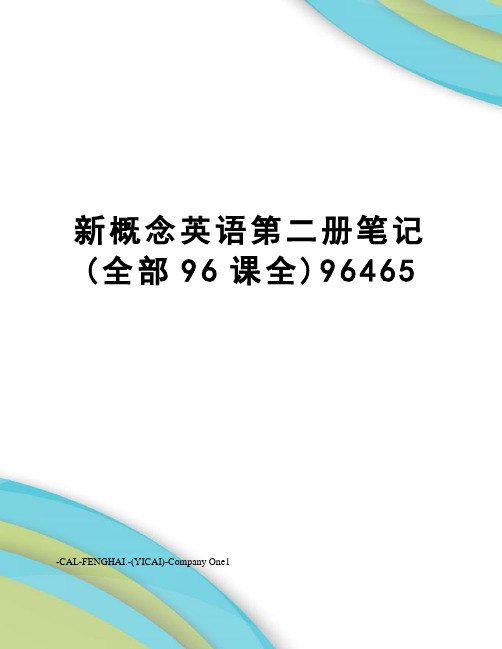
新概念英语第二册笔记(全部96课全)96465-CAL-FENGHAI.-(YICAI)-Company One1新概念英语第二册私人的① adj. 私人的private life 私生活private school 私立学校It's my private letter. (如果妈妈想看你的信)It's my private house. (如果陌生人想进你的房子)② adj. 普通的private citizen 普通公民I’m a private citizen. (citizen n. 公民)private soldier 大兵《Private Ryan》(《拯救大兵瑞恩》)public adj. 公众的,公开的(private的反义词)public school 公立学校public letter 公开信public place 公共场所privacy n.隐私It’s privacy. 这是我的隐私!(不愿让别人知道的)★conversation n.谈话have a + talk/chat/dialogue/conversation/gossip 名词变动词conversation 一般用于正式文体中, 内容上往往不正式subject of conversation 话题They are having a conversation.talk 内容可正式可不正式, 也可以私人Let’s have a talk.dialogue 对话, 可以指正式国家与国家会谈China and Korea are having a dialogue.chat 闲聊,就是北京人说的“侃”,说的是无关紧要的事。
gossip 嚼舌头, 说长道短★theatre n.剧场, 戏剧cinema n.电影院★seat n.座位have a good seat/place,这里的seat指place(指地点),而不是chair. take a seat/take your seat 坐下来, 就坐Is the seat taken 这个位置有人吗请坐的3种说法 :Sit down, please. (命令性)Take your seat, please.Be seated, please. (更礼貌)作为动词的seat与sit的区别sit(sat,sitten) vi. 就座He is sitting there. 他坐在那儿。
新概念英语第二册逐句精讲语言点第96课(2)
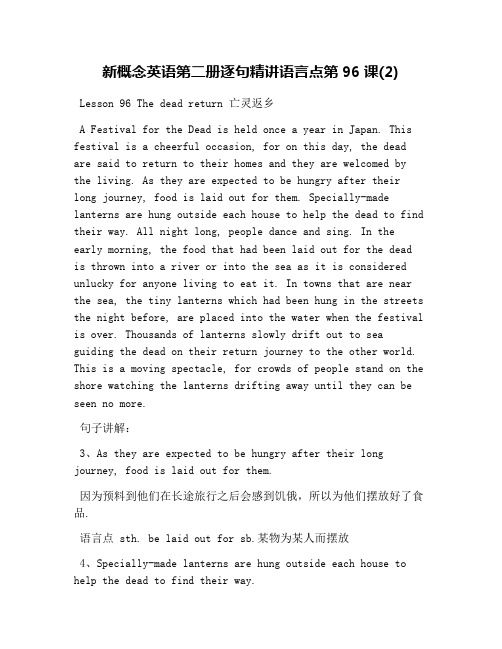
新概念英语第二册逐句精讲语言点第96课(2)Lesson 96 The dead return 亡灵返乡A Festival for the Dead is held once a year in Japan. This festival is a cheerful occasion, for on this day, the dead are said to return to their homes and they are welcomed by the living. As they are expected to be hungry after their long journey, food is laid out for them. Specially-made lanterns are hung outside each house to help the dead to find their way. All night long, people dance and sing. In the early morning, the food that had been laid out for the dead is thrown into a river or into the sea as it is considered unlucky for anyone living to eat it. In towns that are near the sea, the tiny lanterns which had been hung in the streets the night before, are placed into the water when the festival is over. Thousands of lanterns slowly drift out to sea guiding the dead on their return journey to the other world. This is a moving spectacle, for crowds of people stand on the shore watching the lanterns drifting away until they can be seen no more.句子讲解:3、As they are expected to be hungry after their long journey, food is laid out for them.因为预料到他们在长途旅行之后会感到饥俄,所以为他们摆放好了食品.语言点 sth. be laid out for sb.某物为某人而摆放4、Specially-made lanterns are hung outside each house to help the dead to find their way.人们把特制的灯笼挂在各家的门外,以协助这些亡灵找到回家的路。
